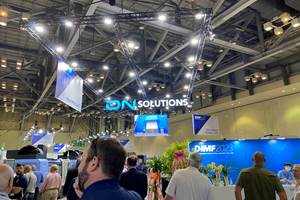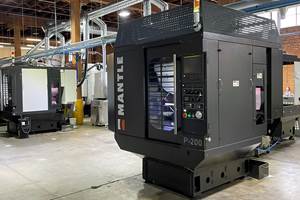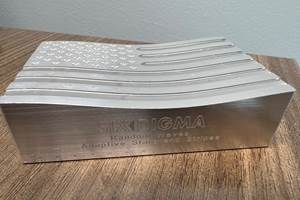Drive Train Facility Moves From Punched Tape To DNC
This Rockwell plant measures 200,000 square feet, employs a staff of 460 and is primarily involved in the production of drive shafts for semi-trucks. As the product line evolved, so did their manufacturing methods.
Share
In 1961, Rockwell International was busy manufacturing products that were critical to the space race. That same year, they opened a plant in Fairfield, Iowa, that made power take-off shafts for agricultural equipment. It is the power take-off shafts that provide power from a tractor to an implement such as a baling machine or a grain elevator.
As Americans began to move away from agriculture and became a more mobile society, Rockwell's Fairfield division followed suit. Due in large part to the consolidation of other facilities, this division started to manufacture less farming equipment and more transportation products. Today the plant measures 200,000 square feet, employs a staff of 460 and is primarily involved in the production of drive shafts for semi-trucks. As the product line evolved, so did Rockwell's manufacturing methods.
During most of the 1980s, the majority of the company's 45 machines had their part programs contained on Mylar tape that was stored in small plastic film canisters. While Mylar tape was considered "high tech" at one time, it was obsolete by the end of the decade. In 1989, Lee Greek, manager of Manufacturing Services, began approaching his machine tool operators and engineering staff about converting the shop floor from tape to some type of direct numerical control (DNC) system.
While the company considered the idea, the film canister system became more and more difficult to manage. First of all, explained Mr. Greek, there were delays in finding the correct tape for each job. "You had all these little film canisters floating around out there and it just wasn't real well organized. Secondly there was a constant re-making of tapes. When we couldn't find a tape, my engineers would have to go make a new tape of the original or pull it up on the system and re-punch a new tape."
Mr. Greek was also aware that there was a problem whenever revisions had to be made. "When a change for a product required a new tape, the engineers would make the new tape and send it out to the shop floor. But that was no guarantee that the operator would actually wind up using it. He might not find the old tape to throw it out, so consequently he might grab the old tape to run the job. That had happened to us several times." This problem also happened when there were "temporary tapes" for short-term revisions and on occasion, the standard tape would be mistakenly discarded. Other problems included program delays and the obsolete 8-inch floppy drive technology that was on some of the machines.
After struggling with the Mylar tape method for several more years, the company's corporate management finally decided to start taking bids for a DNC network. One company that Rockwell requested a bid from was Greco Systems of El Cajon, California. Mr. Greek was already familiar with Greco Systems from having purchased numerous CNC Mini-files since the mid-1980s as disk-drive replacements for the tape readers as they broke down.
The CNC Minifile is a disk-driven memory storage and part program management unit designed especially to withstand harsh shopfloor environments. The fact this device can communicate to nearly every NC machine tool ever manufactured has made it an industry standard. All of the CNC Minifiles owned by Rockwell's Fairfield Division had been purchased through one of Greco Systems' distributors, Richmond Machine and Engineering, Inc. of Columbus, Mississipi.
Al Johnson, owner of Richmond Machine, had established a long-term relationship with Rockwell as an expert on the company's Allen Bradley controls, and he paid occasional visits to the Fairfield plant whenever maintenance was required for the controls. During a service call in 1993, Mr. Greek talked to Mr. Johnson about the prospect of installing a DNC networking system on the shop floor. After Mr. Greek explained the requirements of the proposed system, Mr. Johnson returned to Fairfield at a later date with a proposal from Greco Systems outlining their WinDNC software application.
WinDNC is a Windows-based software package designed for automated parts program transfer and storage. This user-friendly multi-tasking application is much like the CNC Minifile, in that it has the ability to communicate to nearly every NC machine tool in use today. Another feature of WinDNC is its Remote-Call-Down capabilities. Rather than having to leave their machines to go to the DNC host computer, Remote-Call-Down allows operators to transfer programs directly to and from their machine cells, thus saving substantial time and effort.
Mr. Greek got two proposals from other DNC distributors; however, their systems were either not compatible with the existing hardware or they offered complete shopfloor control systems. Rockwell already had an MRP system and therefore, was in the market only for a basic DNC system. Finally, in late 1995, Greco Systems' bid was approved for installation by Rockwell. The decision was based not only on hardware compatibility, but also the reliability of the CNC Minifiles that Rockwell had purchased through the years. "Greco is a reputable company," explained Mr. Greek. "I also had faith in Al Johnson, and his recommendations carried alot of weight with me. And, the CNC Minifiles that we had seemed to be pretty crash-worthy."
Richmond Machine began the installation process in early 1996. After some initial starts and stops, the network system became operational and was communicating to 14 of the company's machines. The WinDNC software was loaded onto a 486 level PC that communicates through a Novell network. All the part programs are stored in the local area network (LAN), then transferred to the 486 PC when needed. The LAN is backed up every night. This saves Mr. Greek the trouble of having to back up the PC, but this added security is important to the company because, as he points out, "there are two types of computer users—those who have experienced hard drive failure and those who will."
The DNC network was organized in a "daisy chain" configuration. This is where the interface card on the WinDNC host communicates to one Network Interface Unit (NIU) also manufactured by Greco Systems. The NIU is a serial interface with eight isolated RS-232 ports and two RS-422 ports. Six of these ports are used to connect the CNC Minifiles (now used as Behind-The-Reader or BRT devices) sitting at the machine cells to the network and two of the ports are left empty. This configuration makes the most sense for Rockwell because "that way, if something should happen to one port, I could just switch one cable and would have another `address' I could use without having to put up a new card or a new board," says Mr. Greek. The RS-422 ports are used as "input" and "output" ports and are connected with another NIU. This second NIU also has eight ports, six of which communicate to six other BTRs and the two RS-422s serve as input and output ports connected to still another NIU and so forth.
In addition to the CNC Minifiles, Rockwell also uses Greco Systems' CNC stations and machine tool interface controllers (MTICs) as BTR devices. Like the CNC Minifile, the CNC Station is a disk-driven memory storage and part program management device; however, this unit comes equipped with a keyboard for shopfloor editing and can be used as a workstation on a network system. The MTIC is an economical interface device that provides serial-to-parallel bidirectional communication to machine tool controls outfitted with tape readers. These units also can be used to provide additional memory to the machine tools, but Rockwell generally uses them as interface devices to machines where the programs can be loaded directly into the controls.
Although it can be used to call programs directly into controls with RS-232 ports, the company uses the Remote-Call-Down feature of the WinDNC application to download part programs from the network and into the CNC Station or CNC Minifile, located at the machine cell. At that point the operator transfers the program directly into the control from the CNC Station or CNC Minifile. These devices can be used to store the programs until needed, but at Rockwell, they are used strictly as network communication units. This is done to ensure that only the most current revisions on the network system are used and that there are no obsolete programs that could mistakenly be stored by the CNC Minifiles or CNC Stations or transferred to the machines.
Presently the company has about 15 CNC Minifiles, 12 CNC Stations, eight MTICs and six NIUs and the systems communicate to over 30 machine tools. Mr. Greek hopes to have all the machine tools (totaling about 45) operating on the network by the end of this year. As for the machines on the network, their operators were able to learn to use the system very quickly. "Training actually lasted from 15 to 30 minutes," he reports. "We followed up with some simple directions and time saving steps." The operators had the system mastered within a week.
The cost savings provided by the new network were immediately evident. Mr. Greek estimates that installation costs for the first 14 machines ran about $35,000; however, the engineering time and materials saved due to the network paid the system off in approximately three months. These savings include the hours no longer required for program run time, or the need to re-write programs, punching the tape and transporting it to the shop floor. He pointed out that the savings are probably even greater than estimated because the time spent by operators searching for tapes and programs were not figured into the savings estimate.
There were other advantages to the new DNC system as well. "The side benefit is the revision control," said Mr. Greek, referring to the confusion caused when there were several revisions of the same part. But one of the most important benefits was yet to come. "We put this system in while we were working hard to get our ISO certification and this just fell in beautifully with that," he reported. Rockwell's Fairfield Division is now ISO9002 certified.
Although the company has moved away from its agricultural roots, the people that live in the area are still very much involved in making their commodities grow through increasingly advanced technology. And much like the nearby cornfields, it is more efficient technology that has allowed production at Rockwell's Fairfield, Iowa, Division to take root and grow effectively.
Related Content
DN Solutions Responds to Labor Shortages, Reshoring, the Automotive Industry and More
At its first in-person DIMF since 2019, DN Solutions showcased a range of new technologies, from automation to machine tools to software. President WJ Kim explains how these products are responses to changes within the company and the manufacturing industry as a whole.
Read MoreIn Moldmaking, Mantle Process Addresses Lead Time and Talent Pool
A new process delivered through what looks like a standard machining center promises to streamline machining of injection mold cores and cavities and even answer the declining availability of toolmakers.
Read MoreHow to Pass the Job Interview as an Employer
Job interviews are a two-way street. Follow these tips to make a good impression on your potential future workforce.
Read MoreBuilding Machines and Apprenticeships In-House: 5-Axis Live
Universal machines were the main draw of Grob’s 5-Axis Live — though the company’s apprenticeship and support proved equally impressive.
Read MoreRead Next
The Future of High Feed Milling in Modern Manufacturing
Achieve higher metal removal rates and enhanced predictability with ISCAR’s advanced high-feed milling tools — optimized for today’s competitive global market.
Read MoreIMTS 2024: Trends & Takeaways From the Modern Machine Shop Editorial Team
The Modern Machine Shop editorial team highlights their takeaways from IMTS 2024 in a video recap.
Read MoreInside Machineosaurus: Unique Job Shop with Dinosaur-Named CNC Machines, Four-Day Workweek & High-Precision Machining
Take a tour of Machineosaurus, a Massachusetts machine shop where every CNC machine is named after a dinosaur!
Read More





























